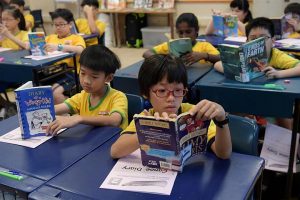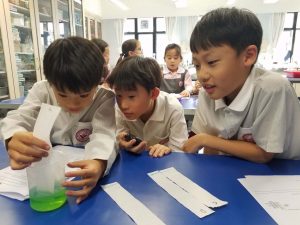
How Reading Habits Enhance English Proficiency: Insights for Singapore Learners
English proficiency is essential in Singapore, where it serves as the primary language for education, business, and daily communication. Strong reading habits are a key

In today’s fast-paced and ever-changing world, critical thinking skills have become more important than ever for students. These skills enable young learners to analyse information, evaluate different perspectives, and make informed decisions. In Singapore, where academic excellence is highly valued, fostering critical thinking is essential to help students thrive not just in school but also in their future careers.
At Stepping Stones Learning Centre, we believe that equipping students with strong analytical and problem-solving abilities prepares them for long-term success. Our tailored programmes focus on nurturing these essential skills through engaging and interactive learning experiences.

Critical thinking is a fundamental skill that helps students succeed in various subjects and disciplines. It goes beyond memorisation and encourages deeper understanding. Here’s how it enhances academic performance:
By integrating critical thinking into the learning process, students become more independent learners who can adapt to new challenges. At Stepping Stones Learning Centre, we help students develop these skills through structured lessons designed to enhance logical reasoning and analytical abilities.
Developing strong analytical skills from a young age helps students navigate an increasingly complex world. Here’s why:
In Singapore, where the education system emphasises excellence, incorporating these skills ensures students are well-prepared for both academic success and future career opportunities.
Stepping Stones Learning Centre provides structured learning programmes that focus on these essential skills, ensuring students gain the confidence and ability to tackle real-world challenges.
While critical thinking is essential, many students face challenges in developing these skills. Some common barriers include:
Addressing these challenges requires a shift in teaching strategies and active efforts from educators and parents to promote analytical thinking. At Stepping Stones Learning Centre, we use innovative teaching methods that move beyond rote learning, helping students develop deeper analytical skills through engaging and thought-provoking lessons.

Encouraging critical thinking doesn’t happen overnight—it requires consistent effort and the right teaching approaches. Here are some effective methods to develop these skills in young learners:
Inquiry-based learning promotes curiosity and independent thinking by allowing students to explore topics through questioning and investigation.
At Stepping Stones Learning Centre, we incorporate inquiry-based learning techniques to encourage deeper thinking and self-directed learning in students.
Asking open-ended questions encourages deeper thought and helps students develop reasoning skills. Examples include:
Such questions challenge students to justify their answers and explore multiple perspectives. This approach is integrated into the lessons at Stepping Stones Learning Centre to help students develop confidence in expressing their thoughts and ideas.
Incorporating real-life scenarios into lessons encourages students to think critically. Strategies include:
These activities help students develop analytical skills while making learning more engaging.
Both educators and parents play a crucial role in shaping a student’s ability to think critically.
By working together, teachers and parents can create an environment that nurtures critical thinking from an early age. Stepping Stones Learning Centre also partners with parents to ensure students receive well-rounded support both at home and in the classroom.
Singapore’s education system recognises the importance of analytical thinking and has taken steps to integrate it into the curriculum. Some initiatives include:
By incorporating these methods, Singapore is equipping students with the skills necessary for academic and professional success.
Critical thinking is a vital skill that prepares students for academic success, career readiness, and lifelong learning. In Singapore, where education is highly competitive, fostering analytical abilities from an early age ensures students can navigate complex challenges with confidence.
For students who need additional guidance in developing critical thinking skills, Stepping Stones Learning Centre offers tailored programmes designed to strengthen problem-solving and analytical thinking.
If you’d like to learn more about how our programmes can benefit your child, feel free to contact us today!
Critical thinking is essential for students in Singapore as it enhances their ability to analyse information, solve problems, and make informed decisions. Given Singapore’s rigorous education system, students who develop strong analytical skills perform better in academics and are better prepared for future careers. These skills also help them adapt to new challenges in an evolving world, making them more resilient learners.
Parents play a crucial role in fostering critical thinking by encouraging open discussions, asking thought-provoking questions, and allowing children to solve problems independently. Simple activities like debating everyday topics, analysing news stories together, or engaging in puzzles and strategy games can also help.
Several engaging activities can help children develop problem-solving and critical thinking skills, such as:
If you’re looking for structured programmes that incorporate such activities, Stepping Stones Learning Centre offers dynamic learning experiences tailored to young learners.
Singapore’s Ministry of Education (MOE) has introduced several initiatives to encourage analytical thinking in students. Schools now integrate inquiry-based learning, project work, and collaborative discussions to move beyond rote memorisation. Subjects like Mathematics and General Papers focus on problem-solving and critical evaluation rather than just recall-based testing. These changes aim to prepare students for real-world challenges by fostering adaptability and independent thinking.
Problem-solving is a core component of critical thinking. It helps students assess situations, identify challenges, and develop logical solutions. By engaging in problem-solving exercises, students learn to evaluate different perspectives, consider consequences, and apply reasoning skills. These abilities are not just useful for academic success but also for everyday life, helping students become independent thinkers and effective decision-makers.
Yes, students who develop critical thinking skills often perform better academically. These skills help them understand complex concepts, analyse questions more deeply, and construct well-reasoned answers. Instead of merely memorising information, they learn to apply their knowledge, which boosts their confidence and prepares them for exams. If your child needs extra support in building strong thinking skills, contact us today to learn more about our personalised learning solutions.
Yes, many tuition and enrichment programmes in Singapore, such as Stepping Stones Learning Centre, focus on developing critical thinking and problem-solving skills. These programmes utilize interactive teaching methods, real-life applications, and inquiry-based learning to help students become analytical thinkers. If you would like to explore how we can assist your child, please feel free to contact us today!

English proficiency is essential in Singapore, where it serves as the primary language for education, business, and daily communication. Strong reading habits are a key

Primary Science education in Singapore has long been centred around rote memorisation, where students absorb facts and formulas to pass exams. While this method ensures
